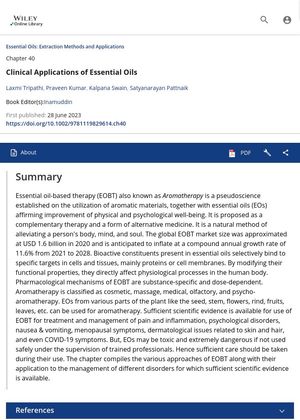Clinical Applications Of Essential Oils
June 2023

TLDR Essential oils can improve health but must be used safely under professional guidance.
The document "Clinical Applications of Essential Oils" discusses Essential oil-based therapy (EOBT), also known as Aromatherapy, a pseudoscience that uses aromatic materials, including essential oils (EOs), to improve physical and psychological well-being. The global EOBT market size was estimated at USD 1.6 billion in 2020 and is expected to grow at a compound annual growth rate of 11.6% from 2021 to 2028. Bioactive constituents in essential oils selectively bind to specific targets in cells and tissues, mainly proteins or cell membranes, affecting physiological processes in the human body. EOBT has been scientifically proven to be effective in treating and managing pain and inflammation, psychological disorders, nausea & vomiting, menopausal symptoms, dermatological issues related to skin and hair, and even COVID-19 symptoms. However, essential oils can be toxic and extremely dangerous if not used safely under the supervision of trained professionals.


